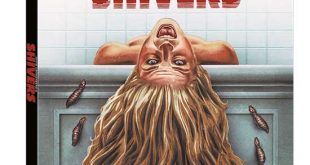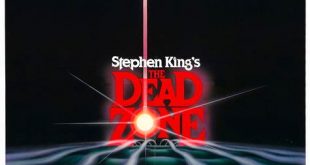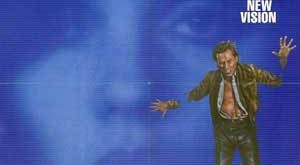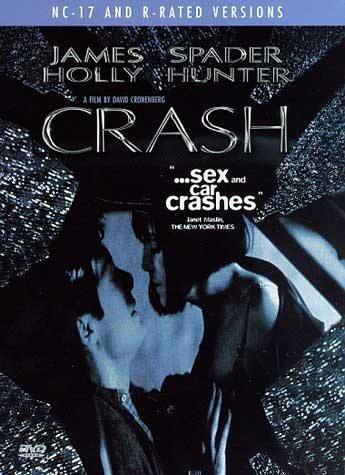 SYNOPSIS:
SYNOPSIS:
“Since a road accident left him with serious facial and bodily scarring, a former television scientist has become obsessed by the marriage of motor-car technology with what he sees as the raw sexuality of car-crash victims. The scientist, along with a crash victim he has recently befriended, sets about performing a series of sexual acts in a variety of motor vehicles, either with other crash victims or with prostitutes whom they contort into the shape of trapped corpses. Ultimately the scientist craves a suicidal union of blood, semen, and engine coolant, a union with which he becomes dangerously obsessed.” (courtesy IMDB)
REVIEW:
Crash (1996) is based upon a novel by British author J.G. Ballard which was first published way back in 1973, an intense mediation on man and machine set in contemporary West London. The automobile becomes the symbol of mankind’s perverse relationship with his self-created media landscapes, in a story about symphorophilia aka car-crash sexual fetishism – its protagonists become sexually aroused by staging and participating in real car-crashes. One potential publisher stated “This author is beyond psychiatric help – do not publish!” The novel was written in a highly sensationalised manner with a frequently harrowing narrative, but it’s definitely one-of-a-kind.
 Any film adaptation of Crash could be best described as an accident waiting to happen, as auteur director David Cronenberg was soon to discover. It was banned and censored throughout the world and, some would say, for good reason. Cronenberg’s version of Crash is perhaps best described as an erotic thriller (in the broadest sense of the term) that follows the lives of James (James Spader) and his wife Catherine (Deborah Unger). While they both seem to have it all, their lives are empty and they crave excitement. When James has a car accident and kills the husband of Helen Remington (Holly Hunter), he crosses the line between sanity and outright dementia – he starts to find eroticism in the thrill of car crashes.
Any film adaptation of Crash could be best described as an accident waiting to happen, as auteur director David Cronenberg was soon to discover. It was banned and censored throughout the world and, some would say, for good reason. Cronenberg’s version of Crash is perhaps best described as an erotic thriller (in the broadest sense of the term) that follows the lives of James (James Spader) and his wife Catherine (Deborah Unger). While they both seem to have it all, their lives are empty and they crave excitement. When James has a car accident and kills the husband of Helen Remington (Holly Hunter), he crosses the line between sanity and outright dementia – he starts to find eroticism in the thrill of car crashes.
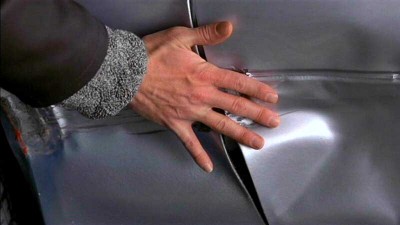 While recovering from the accident, he visits the wreck of his car at a scrap yard and finds Helen mourning over the death of her husband. They are instantly aware of their mutual attraction to the sexual power of the automobile and quickly engage in passionate car-park sex. As they explore their petroleum-fueled desires further they meet Vaughan (Elias Koteas), a car-crash addict with only one nipple who, along with his merry band of sick and twisted freaks, lives for the orgasmic rush of crumpling steel.
While recovering from the accident, he visits the wreck of his car at a scrap yard and finds Helen mourning over the death of her husband. They are instantly aware of their mutual attraction to the sexual power of the automobile and quickly engage in passionate car-park sex. As they explore their petroleum-fueled desires further they meet Vaughan (Elias Koteas), a car-crash addict with only one nipple who, along with his merry band of sick and twisted freaks, lives for the orgasmic rush of crumpling steel.
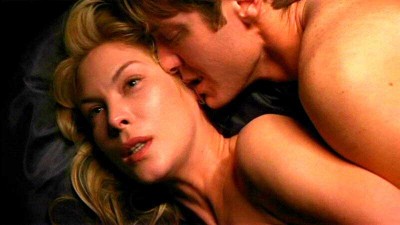 Soon they’re watching crash-test films like p*rnography and paging through photos of car wrecks like Playboy. But can James and Catherine survive a world of high-speed thrills where fast cars and serious head injuries are all the rage? Will their libidos kill them before they can achieve orgasm? Will the ludicrous plot annoy you to distraction? Will the final sex scene make you sick beyond revulsion? In most cases the answer will probably be ‘yes’. To give you an idea of what sort of filmmaker David Cronenberg is, it is worth quoting him at length from a BBC radio interview circa 1983:
Soon they’re watching crash-test films like p*rnography and paging through photos of car wrecks like Playboy. But can James and Catherine survive a world of high-speed thrills where fast cars and serious head injuries are all the rage? Will their libidos kill them before they can achieve orgasm? Will the ludicrous plot annoy you to distraction? Will the final sex scene make you sick beyond revulsion? In most cases the answer will probably be ‘yes’. To give you an idea of what sort of filmmaker David Cronenberg is, it is worth quoting him at length from a BBC radio interview circa 1983:
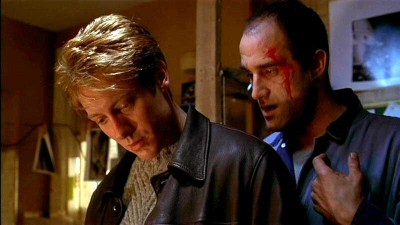 “When people ask me, ‘Why do you make horror films?’ I immediately have to go back to Aristotle and his theory of catharsis as being a justification for high tragedy, or even comedy. For me horror films are films of confrontation, not films of escape at all, but in a horror film one confronts things that you really might not want to cope with in your real life, in a kind of safe dreamlike way. But you will meet these things eventually. I’m talking about aging, death and separation. That’s the metaphorical level that horror films work on. All of my films, I’m aware of it now, are very body-conscious, because for me the body is really the source of horror in human beings – it is the body which ages and the body which dies. It really is very Cartesian of me, I suppose, because to me the mind-body split is the source of the mystery and also the horror, which I think ultimately we have to confront. You see people whose minds are perfectly together while their bodies begin to distort, begin to change, begin to age, begin to rot, whatever. That to me is horror. I don’t want to give my audience a chance to get too distanced. That’s why my films are very urban and very contemporary in their setting.”
“When people ask me, ‘Why do you make horror films?’ I immediately have to go back to Aristotle and his theory of catharsis as being a justification for high tragedy, or even comedy. For me horror films are films of confrontation, not films of escape at all, but in a horror film one confronts things that you really might not want to cope with in your real life, in a kind of safe dreamlike way. But you will meet these things eventually. I’m talking about aging, death and separation. That’s the metaphorical level that horror films work on. All of my films, I’m aware of it now, are very body-conscious, because for me the body is really the source of horror in human beings – it is the body which ages and the body which dies. It really is very Cartesian of me, I suppose, because to me the mind-body split is the source of the mystery and also the horror, which I think ultimately we have to confront. You see people whose minds are perfectly together while their bodies begin to distort, begin to change, begin to age, begin to rot, whatever. That to me is horror. I don’t want to give my audience a chance to get too distanced. That’s why my films are very urban and very contemporary in their setting.”
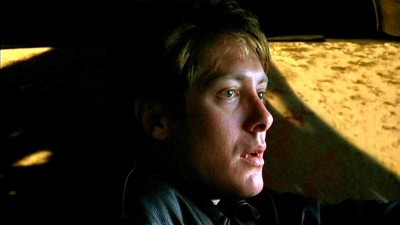 Pretty impressive for an ad-lib answer in a radio interview, but I’m not exactly sure what Mr. Cronenberg was thinking when he scripted Crash. First they’re doing it in the car wash, then they’re sucking on hood ornaments, and before long they’re licking each others scars and having sex on the road after car accidents. The only reason I can think of for making this film is the directorial challenge: How the hell do you make sex in a car, one of the most uncomfortable places possible, arousing? But I’m glad Mr. Cronenberg resisted the temptation of incorporating more car-related puns into the sexy dialogue, like ‘air-bags’, ‘drive-shaft’ or ‘wankel-rotary’.
Pretty impressive for an ad-lib answer in a radio interview, but I’m not exactly sure what Mr. Cronenberg was thinking when he scripted Crash. First they’re doing it in the car wash, then they’re sucking on hood ornaments, and before long they’re licking each others scars and having sex on the road after car accidents. The only reason I can think of for making this film is the directorial challenge: How the hell do you make sex in a car, one of the most uncomfortable places possible, arousing? But I’m glad Mr. Cronenberg resisted the temptation of incorporating more car-related puns into the sexy dialogue, like ‘air-bags’, ‘drive-shaft’ or ‘wankel-rotary’.
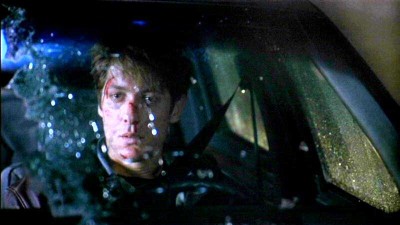 Surprisingly though, and for the first time in the history of cinema, James Spader is for once not the creepiest character in the movie. Elias Koteas as Vaughan is so incredibly revolting that I felt like fast-forwarding every time he appeared on-screen, his performance is one I won’t forget in a hurry – even if I wanted to. The film did leave me with one burning question however: Is ‘safe sex’ doing it with your seat-belt on?
Surprisingly though, and for the first time in the history of cinema, James Spader is for once not the creepiest character in the movie. Elias Koteas as Vaughan is so incredibly revolting that I felt like fast-forwarding every time he appeared on-screen, his performance is one I won’t forget in a hurry – even if I wanted to. The film did leave me with one burning question however: Is ‘safe sex’ doing it with your seat-belt on?
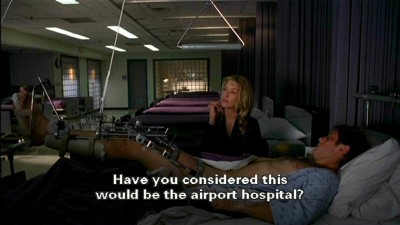 Nevertheless I hope you enjoy watching Crash and, after all, there are worse ways of spending ninety minutes, or a hundred minutes if you’re able to locate the uncut version. Just remember, even the worst David Cronenberg effort is bound to be better than almost anything else found on Hollywood’s so-called A-List, and it’s with that thought in mind I’ll humbly request your company again next week when I’ll expose you to another terrible treasure for…Horror News! Toodles!
Nevertheless I hope you enjoy watching Crash and, after all, there are worse ways of spending ninety minutes, or a hundred minutes if you’re able to locate the uncut version. Just remember, even the worst David Cronenberg effort is bound to be better than almost anything else found on Hollywood’s so-called A-List, and it’s with that thought in mind I’ll humbly request your company again next week when I’ll expose you to another terrible treasure for…Horror News! Toodles!
 Horror News | HNN Official Site | Horror Movies,Trailers, Reviews
Horror News | HNN Official Site | Horror Movies,Trailers, Reviews




